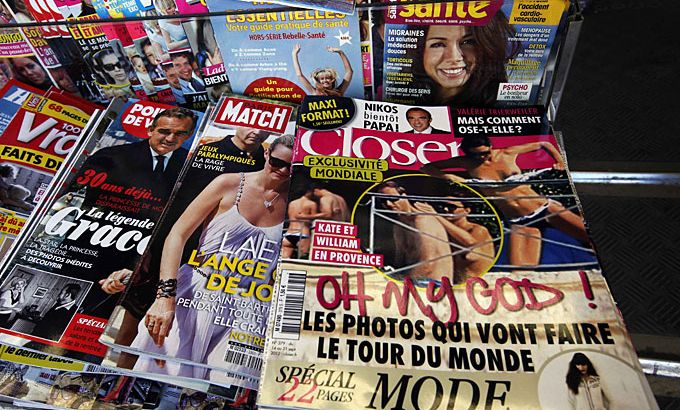
Should limits be placed on free expression?
A French ban on publishing the Duchess of Cambridge’s topless pictures re-ignites debate on privacy and free expression.
The decision to publish topless photos of Kate Middleton, the Duchess of Cambridge and the wife of Britain’s Prince William, in French and Italian magazines and an Irish newspaper has angered the British royal family.
A French court passed an injunction earlier this week to ban the pictures, but in doing so it once again highlighted the debate over freedom of press versus privacy.
|
“Once the privacy horse has bolted it’s too late. The remedy here is far too limited. The photographs have already been disseminated on the internet and any remedy that is put in place now can only have a token effect.” – Paul Tweed, a media lawyer |
The editor-in-chief of the Italian magazine Chi, one of the two involved in the dispute and owned by Silvio Berlusconi, the former Italian prime minister, has defended the decision to publish the photos.
Alfonso Signorini, the editor of Chi magazine, said: “It’s absolutely out of place to get so stressed and worried about these pictures. She’s just a woman sunbathing, I don’t even know where. I can’t even understand the importance…all the talk in the newspapers.”
However, Christopher Mesnooh, a legal commentator, said there had definitely been a breach of privacy.
“This decision is very much in accordance with basic French law in the area of privacy and protection of private life. The opinion itself was short, it is well-reasoned and the judge came out and said that the royal couple clearly demonstrated that their privacy had been invaded by these photographs.”
The controversy over the media’s right to print those pictures comes at a time when a filmmaker’s right to freedom of expression triggered protests across the Muslim world.
|
“In this case where is the freedom and where is the expression? The expression is photos and the freedom is the right to attempt a person’s private life, it’s not very decent and it’s not a case that we, Parisian journalists, are ready to defend or support.” – Christian Makarian, the editor of France’s L’Express magazine |
A 14-minute trailer for Innocence of Muslims posted online angered many Muslims for its offensive depiction of Islam’s Prophet Muhammad.
And while many Muslims have renewed calls for blasphemy laws, both cases show how difficult it is to put limits on freedom of expression in an age when social media like Twitter and Youtube spread words and images so widely and quickly.
In this episode of Inside Story we ask: Do strict privacy laws breach freedom of expression?
Joining presenter Hazem Sika for the discussion are: Paul Tweed, a media lawyer specialising in defamation and privacy laws; Padraig Reidy, the news editor of Index on Censorship, a publication which defends freedom of expression; and Christian Makarian, the editor of France’s L’Express magazine.
|
“The problem with any case where there’s a privacy versus free expression balance is that we can only really deal with them on a case-by-case basis and look at the public interest after the fact.” Padraig Reidy, the news editor of Index on Censorship |